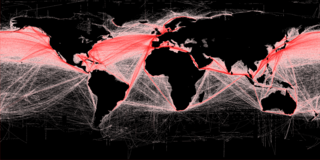
Freight transport, also referred as freight forwarding, is the physical process of transporting commodities and merchandise goods and cargo. The term shipping originally referred to transport by sea but in American English, it has been extended to refer to transport by land or air as well. "Logistics", a term borrowed from the military environment, is also used in the same sense.
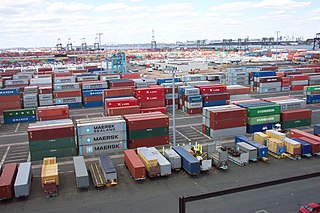
Containerization is a system of intermodal freight transport using intermodal containers. Containerization, also referred as container stuffing or container loading, is the process of unitization of cargoes in exports. Containerization is the predominant form of unitization of export cargoes, as opposed to other systems such as the barge system or palletization. The containers have standardized dimensions. They can be loaded and unloaded, stacked, transported efficiently over long distances, and transferred from one mode of transport to another—container ships, rail transport flatcars, and semi-trailer trucks—without being opened. The handling system is mechanized so that all handling is done with cranes and special forklift trucks. All containers are numbered and tracked using computerized systems.

An intermodal container, often called a shipping container or ISO Container, is a large standardized container designed and built for intermodal freight transport, meaning these containers can be used across different modes of transport – from ship to rail to truck – without unloading and reloading their cargo. Intermodal containers are primarily used to store and transport materials and products efficiently and securely in the global containerized intermodal freight transport system, but smaller numbers are in regional use as well. These containers are known under a number of names. Based on size alone, up to 95% of intermodal containers comply with ISO standards, and can officially be called ISO containers. Many other names are simply: container, cargo or freight container, shipping, sea or ocean container, container van or sea van, sea can or C can, or MILVAN, SEAVAN, or RO/RO. The also used term CONEX (Box) is a technically incorrect carry-over usage of the name of an important predecessor of the international ISO containers, namely the much smaller prior steel CONEX boxes used by the U.S. Army.

Intermodal freight transport involves the transportation of freight in an intermodal container or vehicle, using multiple modes of transportation, without any handling of the freight itself when changing modes. The method reduces cargo handling, and so improves security, reduces damage and loss, and allows freight to be transported faster. Reduced costs over road trucking is the key benefit for inter-continental use. This may be offset by reduced timings for road transport over shorter distances.

In transportation, freight refers to goods conveyed by land, water or air, while cargo refers specifically to freight when conveyed via water or air. In economics, freight refers to goods transported at a freight rate for commercial gain. The term cargo is also used in case of goods in the cold-chain, because the perishable inventory is always in transit towards a final end-use, even when it is held in cold storage or other similar climate-controlled facilities, including warehouses.
Con-way, Inc. was an American multinational freight transportation and logistics company headquartered in Ann Arbor, Michigan, United States. With annual revenues of $5.5 billion, Con-way was the second largest less-than-truckload transport provider in North America, with additional operations for global contract logistics, managed transportation, truckload and freight brokerage. The company's services were sold through its primary operating companies of Con-way Freight, Con-way Truckload and Menlo Worldwide. These operating units provided less-than-truckload (LTL), full truckload and multimodal freight transportation, as well as logistics, warehousing and supply chain management services. Con-way, Inc. and its subsidiaries operated from more than 500 locations across North America and in 20 countries.

Rail freight transport is the use of railroads and trains to transport cargo as opposed to human passengers.
Truckload shipping is the movement of large amounts of homogeneous cargo, generally the amount necessary to fill an entire semi-trailer or intermodal container. A truckload carrier is a trucking company that generally contracts an entire trailer-load to a single customer. This is as opposed to a less-than truckload (LTL) company that generally mixes freight from several customers in each trailer. One advantage Full Truckload (FTL) carriers have over Less than Truckload carriers is that the freight is never handled en route, whereas an LTL shipment will typically be transported on several different trailers. Truckload shipments are typically run on 48' or 53'dry van trailers which will hold 24 or 26 pallets respectively.

Less-than-truckload shipping or less than load (LTL) is the transportation of an amount of freight sized between individual parcels and full truckloads. Parcel carriers handle small packages and freight that can be broken down into units less than approximately 150 pounds (68 kg). Full truckload carriers move entire semi-trailers. Semi-trailers are typically between 26 and 53 feet and require a substantial amount of freight to make such transportation economical. The term LTL can refer to the freight itself, or to the carrier that transports the such freight.
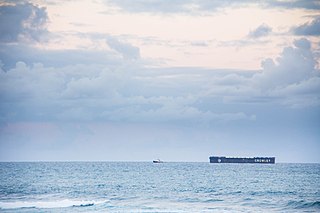
Crowley, legally Crowley Maritime Corporation, is based in Jacksonville, Florida. Founded in 1892, Crowley is primarily a family- and employee-owned vessel management, owner, and supply chain logistics services company, providing services globally. As of July 2016, Crowley was ranked as the 13th largest private company in Florida, employing approximately 5,300 people worldwide with revenues of $2.2 billion. It provides its services using a fleet of more than 300 vessels, consisting of RO-RO vessels, LO-LO vessels, tankers, Articulated Tug-Barges (ATBs), tugs and barges. Crowley's land-based facilities and equipment include terminals, warehouses, tank farms, and specialized vehicles.
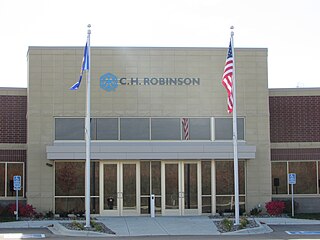
C.H. Robinson Worldwide, Inc. is an American transportation company that includes third-party logistics (3PL). The company offers freight transportation, transportation management, brokerage and warehousing. It offers truckload, less than truckload, air freight, intermodal, and ocean transportation.

Malcolm Purcell McLean was an American businessman who invented the modern intermodal shipping container, which revolutionized transport and international trade in the second half of the twentieth century. Containerization led to a significant reduction in the cost of freight transportation by eliminating the need for repeated handling of individual pieces of cargo, and also improved reliability, reduced cargo theft, and cut inventory costs by shortening transit time. Containerization is a major driver of globalization.
New England Motor Freight, Inc. (NEMF) was a unionized less-than-truckload (LTL) and truckload freight carrier, based in Elizabeth, New Jersey. It was one of the largest LTL carriers in the US Northeast when it entered Chapter 11 bankruptcy in 2019 and subsequently shut down all operations in 2020.

Contract Freighters, Inc. (CFI), a subsidiary of Heartland Express, is an American truckload freight carrier headquartered in Joplin, Missouri with operations in the continental US, Canada, and Mexico. Easily recognizable on the highway by their iconic bright red Kenworth trucks. CFI provides point-to-point, full truckload, dry van service, as well as refrigerated transport, and utilizes single drivers as well as two-person driver teams over long-haul routes—most commonly with each trailer containing only one customer's goods.

Con-way Freight was a less-than-truckload (LTL) motor carrier headquartered in Ann Arbor utilizing a network of freight service centers to provide regional, inter-regional and transcontinental less-than-truckload freight services throughout North America. The business unit provided day-definite delivery service to manufacturing, industrial and retail customers. Con-way Freight was the largest division of Con-way, Inc. with 16,600 employees, more than 365 operating locations, 16,000 dock doors and 32,750 tractors and trailers. The company was founded by Consolidated Freightways (CF) of Portland, Oregon as a non union spinoff, for less than truckload hauling. In 2009 Con-way Freight reported revenues of over $2.6 billion. Con-way Inc., including Con-way Freight and sibling company Con-way Truckload, was acquired by XPO Logistics, a primarily non-asset logistics company from Greenwich, Connecticut, in a deal worth $3.5 billion.
Averitt Express is a privately owned transportation and supply chain management company based in Cookeville, Tennessee.
Horizon Lines, Inc. was an American domestic ocean shipping and logistics company headquartered in Charlotte, North Carolina. It was the largest Jones Act-compliant maritime shipping and logistics company, and accounted for approximately 37 per cent of all U.S. container shipments linking the continental United States to Alaska, Hawaii and Puerto Rico. Under the Jones Act, maritime shipments between U.S. ports is restricted to U.S.-built, owned, and flagged vessels operated by predominantly U.S.-citizen crews. The company originated from Sea-Land Service, Inc. The domestic liner operations of Sea-Land were sold in 2003 and thereafter operated under the name Horizon Lines. Horizon became a publicly traded company on the New York Stock Exchange in 2005. In 2015 the company was acquired by Matson Navigation Company.

XPO, Inc. is an American transportation company that conducts less-than-truckload shipping in North America. The company has headquarters in Greenwich, Connecticut, U.S., and 564 locations globally.
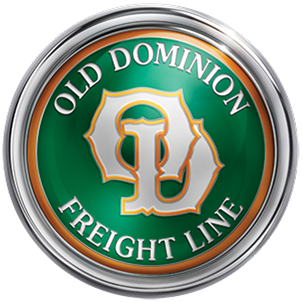
Old Dominion Freight Line, Inc. (ODFL) is an American regional, inter-regional and national less than truckload shipping (LTL) company. In addition to its core LTL services, the company offers expedited, logistics and household moving services.

PLS Logistics Service (PLS), founded in 1991, is an American third-party logistics provider in the metal, lumber, and building industries. Headquartered in Cranberry Township, Pennsylvania, a suburb of Pittsburgh, PLS Logistics Services provides freight transportation, logistics, and technology services for businesses. PLS serves a variety of companies, including suppliers, producers, wholesalers, service centers, and end-users.













